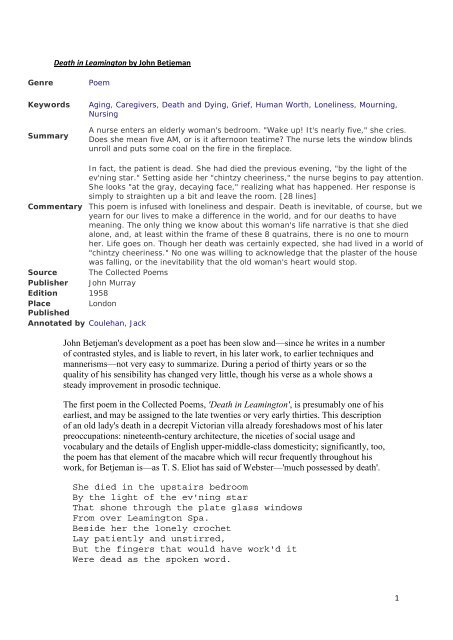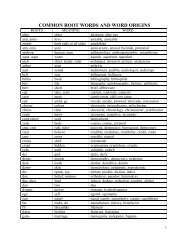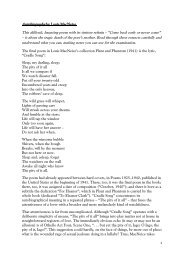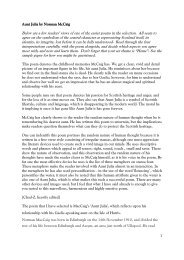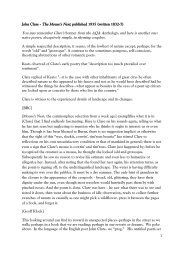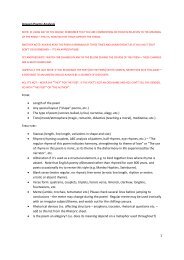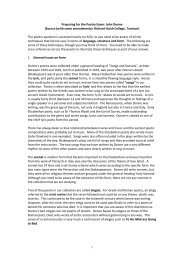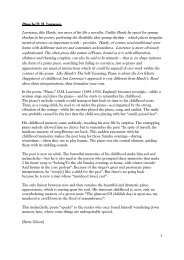Death in Leamington by John Betjeman - Hellesdon.org
Death in Leamington by John Betjeman - Hellesdon.org
Death in Leamington by John Betjeman - Hellesdon.org
You also want an ePaper? Increase the reach of your titles
YUMPU automatically turns print PDFs into web optimized ePapers that Google loves.
<strong>Death</strong> <strong>in</strong> Leam<strong>in</strong>gton <strong>by</strong> <strong>John</strong> <strong>Betjeman</strong><br />
Genre Poem<br />
Keywords Ag<strong>in</strong>g, Caregivers, <strong>Death</strong> and Dy<strong>in</strong>g, Grief, Human Worth, Lonel<strong>in</strong>ess, Mourn<strong>in</strong>g,<br />
Nurs<strong>in</strong>g<br />
Summary<br />
A nurse enters an elderly woman's bedroom. "Wake up! It's nearly five," she cries.<br />
Does she mean five AM, or is it afternoon teatime? The nurse lets the w<strong>in</strong>dow bl<strong>in</strong>ds<br />
unroll and puts some coal on the fire <strong>in</strong> the fireplace.<br />
In fact, the patient is dead. She had died the previous even<strong>in</strong>g, "<strong>by</strong> the light of the<br />
ev'n<strong>in</strong>g star." Sett<strong>in</strong>g aside her "ch<strong>in</strong>tzy cheer<strong>in</strong>ess," the nurse beg<strong>in</strong>s to pay attention.<br />
She looks "at the gray, decay<strong>in</strong>g face," realiz<strong>in</strong>g what has happened. Her response is<br />
simply to straighten up a bit and leave the room. [28 l<strong>in</strong>es]<br />
Commentary This poem is <strong>in</strong>fused with lonel<strong>in</strong>ess and despair. <strong>Death</strong> is <strong>in</strong>evitable, of course, but we<br />
yearn for our lives to make a difference <strong>in</strong> the world, and for our deaths to have<br />
mean<strong>in</strong>g. The only th<strong>in</strong>g we know about this woman's life narrative is that she died<br />
alone, and, at least with<strong>in</strong> the frame of these 8 quatra<strong>in</strong>s, there is no one to mourn<br />
her. Life goes on. Though her death was certa<strong>in</strong>ly expected, she had lived <strong>in</strong> a world of<br />
"ch<strong>in</strong>tzy cheer<strong>in</strong>ess." No one was will<strong>in</strong>g to acknowledge that the plaster of the house<br />
was fall<strong>in</strong>g, or the <strong>in</strong>evitability that the old woman's heart would stop.<br />
Source The Collected Poems<br />
Publisher <strong>John</strong> Murray<br />
Edition 1958<br />
Place<br />
London<br />
Published<br />
Annotated <strong>by</strong> Coulehan, Jack<br />
<strong>John</strong> <strong>Betjeman</strong>'s development as a poet has been slow and—s<strong>in</strong>ce he writes <strong>in</strong> a number<br />
of contrasted styles, and is liable to revert, <strong>in</strong> his later work, to earlier techniques and<br />
mannerisms—not very easy to summarize. Dur<strong>in</strong>g a period of thirty years or so the<br />
quality of his sensibility has changed very little, though his verse as a whole shows a<br />
steady improvement <strong>in</strong> prosodic technique.<br />
The first poem <strong>in</strong> the Collected Poems, '<strong>Death</strong> <strong>in</strong> Leam<strong>in</strong>gton', is presumably one of his<br />
earliest, and may be assigned to the late twenties or very early thirties. This description<br />
of an old lady's death <strong>in</strong> a decrepit Victorian villa already foreshadows most of his later<br />
preoccupations: n<strong>in</strong>eteenth-century architecture, the niceties of social usage and<br />
vocabulary and the details of English upper-middle-class domesticity; significantly, too,<br />
the poem has that element of the macabre which will recur frequently throughout his<br />
work, for <strong>Betjeman</strong> is—as T. S. Eliot has said of Webster—'much possessed <strong>by</strong> death'.<br />
She died <strong>in</strong> the upstairs bedroom<br />
By the light of the ev'n<strong>in</strong>g star<br />
That shone through the plate glass w<strong>in</strong>dows<br />
From over Leam<strong>in</strong>gton Spa.<br />
Beside her the lonely crochet<br />
Lay patiently and unstirred,<br />
But the f<strong>in</strong>gers that would have work'd it<br />
Were dead as the spoken word.<br />
1
<strong>Death</strong> <strong>in</strong> Leam<strong>in</strong>gton <strong>by</strong> <strong>John</strong> <strong>Betjeman</strong><br />
And Nurse came <strong>in</strong> with the tea-th<strong>in</strong>gs<br />
Breast high 'mid the stands and chairs—<br />
But Nurse was alone with her own little soul,<br />
And the th<strong>in</strong>gs were alone with theirs....<br />
And 'Tea !' she said <strong>in</strong> a t<strong>in</strong>y voice<br />
'Wake up ! It's nearly five.'<br />
Oh ! Ch<strong>in</strong>tzy, ch<strong>in</strong>tzy cheer<strong>in</strong>ess,<br />
Half dead and half alive ! . . .<br />
The contractions—'ev'n<strong>in</strong>g', 'work'd'—are habitual with <strong>Betjeman</strong>, and like many of his<br />
other mannerisms carry an echo of m<strong>in</strong>or Victorian verse. Later poems on similar themes<br />
tend to be less mannered, and it is <strong>in</strong>terest<strong>in</strong>g to compare '<strong>Death</strong> <strong>in</strong> Leam<strong>in</strong>gton' with<br />
'Remorse' (1954), of which I quote the first two stanzas:<br />
The lungs draw <strong>in</strong> the air and rattle it out aga<strong>in</strong>;<br />
The eyes revolve <strong>in</strong> their sockets and upwards stare;<br />
No more worry and wait<strong>in</strong>g and troublesome doubt aga<strong>in</strong>—<br />
She whom I loved and left is no longer there.<br />
The nurse puts down her knitt<strong>in</strong>g and walks across to her<br />
With quick professional eye she surveys the dead.<br />
Just one patient the less and little the loss to her,<br />
Distantly tender she settles the shrunken head....<br />
Here the slightly mock<strong>in</strong>g tone of 'Leam<strong>in</strong>gton' has given place to a genu<strong>in</strong>e compassion;<br />
the verse, moreover, is tauter and more firmly controlled, and the whole poem is a far<br />
more proficient piece of work, though some of <strong>Betjeman</strong>'s admirers may regret the<br />
casual, rather amateurish quality which gave the earlier poems a charm of their own.<br />
[Jocelyn Brooke]<br />
At Oxford, <strong>Betjeman</strong> was fortunate <strong>in</strong> meet<strong>in</strong>g such poetic lum<strong>in</strong>aries as Louis MacNeice and<br />
W.H. Auden, but although of the same v<strong>in</strong>tage, never identified himself with what became<br />
known as the MacSpaunday Group, MacNeice and Auden be<strong>in</strong>g jo<strong>in</strong>ed eponymously with<br />
Stephen Spender and Cecil Day Lewis, all very left w<strong>in</strong>g politically and sometimes<br />
Communist, express<strong>in</strong>g their sympathy with the Spanish Civil War of the late n<strong>in</strong>eteen-thirties<br />
with its overture for Hitler's ambitions.<br />
<strong>Betjeman</strong>'s stance <strong>in</strong> poetry may have found some <strong>in</strong>spiration <strong>in</strong> Eliot's view that 'the bus<strong>in</strong>ess<br />
of the poet is not to f<strong>in</strong>d new emotions, but to use the ord<strong>in</strong>ary ones and, <strong>in</strong> work<strong>in</strong>g up <strong>in</strong>to<br />
poetry, to express feel<strong>in</strong>gs which are not <strong>in</strong> actual emotions at all'. Although <strong>Betjeman</strong>, at<br />
times, used a gentle satire, he could express genu<strong>in</strong>e sympathy over sadness as <strong>in</strong> <strong>Death</strong> <strong>in</strong><br />
Leam<strong>in</strong>gton and The <strong>Death</strong> of K<strong>in</strong>g Ge<strong>org</strong>e V. His spiritual strength, although shot through<br />
with some humour and the odd whimsy, was always com<strong>in</strong>g to the surface. He was never<br />
cynical, malicious or scornful; he was, at heart, an 'old softie', <strong>in</strong> later life appear<strong>in</strong>g to some<br />
as fuddy-duddy and bumbl<strong>in</strong>g. Yet he epitomized the view of Samuel <strong>John</strong>son that to a poet,<br />
noth<strong>in</strong>g can be useless.<br />
2
<strong>Death</strong> <strong>in</strong> Leam<strong>in</strong>gton <strong>by</strong> <strong>John</strong> <strong>Betjeman</strong><br />
<strong>Betjeman</strong>'s first volume, Mount Zion, appeared <strong>in</strong> 1933, when he was 27 and his f<strong>in</strong>al actual<br />
new collection came out <strong>in</strong> 1954, thirty years before his death, although his booklet Poems <strong>in</strong><br />
the Porch (Diary of a Church Mouse) came out concurrently to achieve a k<strong>in</strong>d of f<strong>in</strong>ality and<br />
wide recognition. Naturally, there were over a dozen unpublished poems written <strong>in</strong> the thirty<br />
years before his death.<br />
<strong>Betjeman</strong> had become an immensely popular poet with the result that, along the way, sundry<br />
slim volumes appeared conta<strong>in</strong><strong>in</strong>g his poems, eg. High and Low (1966), A Nip <strong>in</strong> the Air<br />
(1974), Church Poems (1981) and Uncollected Poems (1981). It is, of course, difficult to<br />
select poems which are thought, for one reason or another, outstand<strong>in</strong>g but many people not<br />
really <strong>in</strong>terested <strong>in</strong> poetry remember his often quoted Slough:<br />
Come, friendly bombs, and fall on Slough!<br />
It isn't fit for humans now,<br />
There isn't grass to graze a cow.<br />
[Randle Manwar<strong>in</strong>g]<br />
1930: Beg<strong>in</strong>s work at the "Architectural Review" magaz<strong>in</strong>e and helps promote modern styles <strong>by</strong><br />
Le Corbusier and Charles Rennie Mack<strong>in</strong>tosh. Wrote "<strong>Death</strong> <strong>in</strong> Leam<strong>in</strong>gton" for the London<br />
Mercury.<br />
3


